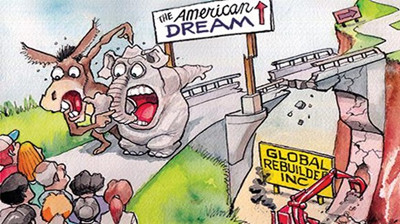Lexington

Too many leaders in the rich West have picked up on gloom about the future as a driver of public distrust of politics, but offer only narrow, partisan solutions, often focused on scrapping opponents' policies that they always disliked. Republicans such as Mr McConnell are right to criticise government when it overreaches. But it is a stretch to suggest that reining in environmental rules on coal, or even repealing Obamacare, can revive the American Dream.











